Centre College | Text
Once Controversial Bluegrass Shop Moves
Report on the Bluegrass Barbershop moving from South Third Street to West Walnut Street. Barber Lester Tarter contends he was forced out. Comments from barber Either O. Richardson contending that he would lose white customers if he integrated his shop
Creator
Taylor, Ollie Lee
Date
1972-01-27
Source
The Centre College Cento, January 27, 1972, Page 1
Format
application/pdf
Rights Statement
This material is made available for use in research, teaching, and private study, pursuant to U.S. Copyright law. Any materials used should be credited "Centre College Special Collections and Archives.” Please notify Centre College Special Collections and Archives if used in a publication.
Transcription of this Item
Transcription not available.
Full Metadata
Identifier
Creator
Date
Publisher
Coverage
Format
Type
Medium
Language
place of repository
Temporal Coverage
Related Items
-
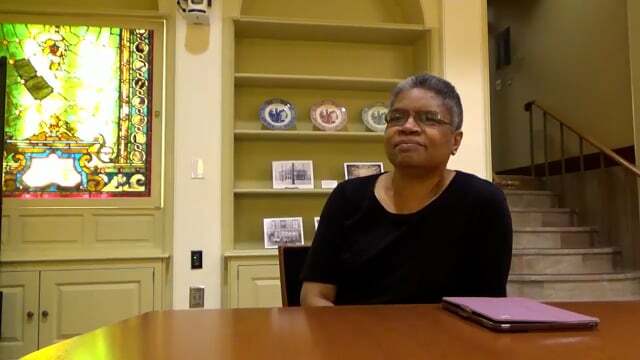 Furman University | Moving image
Furman University | Moving imageJune Manning Thomas Oral History
Video interview with June Manning Thomas. Ms. Thomas enrolled at Furman in 1967 as one of the university's first African American women. She begins the interview speaking about her hometown, Orangeburg, South Carolina, during the 1960s, and being a part of the first group of African American students to attend racially integrated public schools there. As a high school student June attended a summer program at Furman, and she talks about the program and how it infuenced her decision to attend Furman. Ms.Learn more -
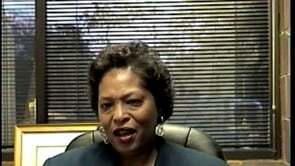 Furman University | Item
Furman University | ItemLillian Brock Flemming Oral History
Video interview with Lillian Brock Flemming, one of the first two African American females to graduate Furman University. Lillian enrolled at Furman in 1967 as one of the university's first African American women. She graduated in 1971, and earned her Masters of Education from Furman in 1975. In 1981, she became the first African-American woman to serve on the Greenville City Council, and in 1989 she was elected Mayor Pro Tempore.Learn more -
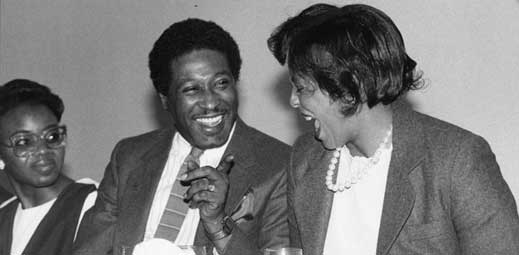 Furman University | Image
Furman University | ImageJoseph Vaughn and Lillian Brock Flemming share a laugh
Joseph Vaughn '68 and Lillian Brock Flemming '71 share a laugh during a Religion in Life lecture titled 'Racial Integration at Furman: 21 Years Later' given in 1986.Learn more -
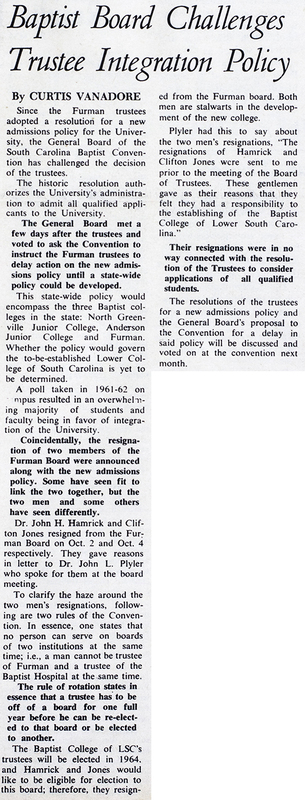 Furman University | Text
Furman University | TextBaptist Board Challenges Trustee Integration Policy
An article appearing in Furman's student newspaper, The Paladin, dated October 26, 1963, detailing a challenge, made by the General Board of the South Carolina Baptist Convention, to the Furman trustee's resolution authorizing Furman to admit all qualified applicants regardless of race.Learn more -
 Furman University | Text
Furman University | TextBoard To Recommend 'Hands-Off' Policy to Baptist Convention
An article appearing in Furman's student newspaper, The Paladin, dated October 23, 1964. The author writes about the General Board of the South Carolina Baptist Convention's recommendation that the convention abopt a hands-off policy towards desegregation. Admission policies would be left to the trustees of it's church supported colleges.Learn more -
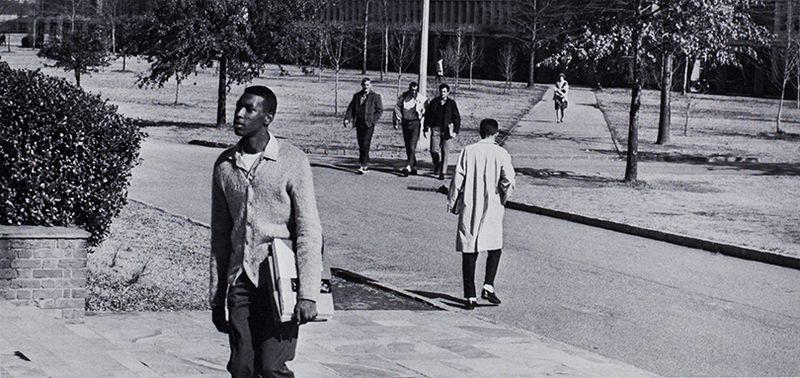 Furman University | Image
Furman University | ImageJoseph Vaughn
Photograph from the 1965 Bonhomie (Furman Yearbook) of Joseph Vaughn '68 standing on the stairs in front of the James B. Duke Library, on the campus of Furman University. Vaughn became the university's first African American student on Jan. 29, 1965.Learn more -
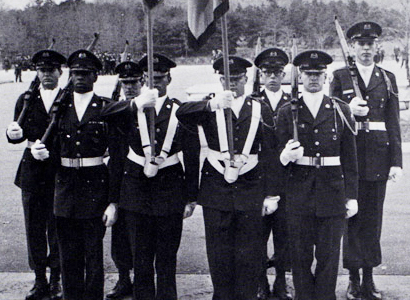 Furman University | Image
Furman University | ImageColor Guard
1966 Color Guard. (Front Row) Joe Vaughn, Cavenaugh, Ethrige, Taylor. (Back Row, Left to Right) Banks, Funderburk, File.Learn more -
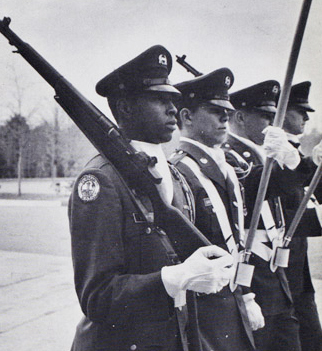 Furman University | Image
Furman University | ImageColor Guard
1966 Color Guard wearing their winter greens. Joe Vaughn is featured in the foregroundLearn more -
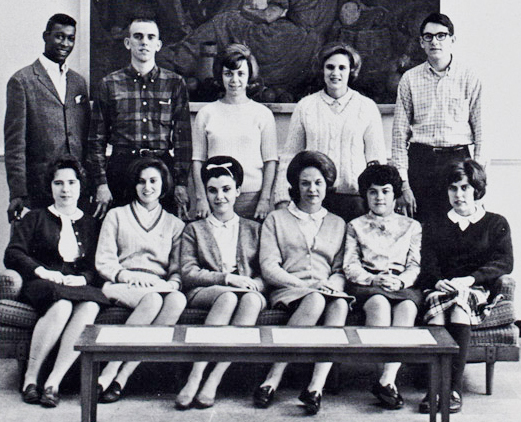 Furman University | Image
Furman University | ImageThe French Club
Photograph from the 1966 Bonhomie (Furman Yearbook) of the French Club, 'Le Salon Francias.' This society was composed of students recommended by their professors for their superior work in the intermediate or advanced levels of French. Joseph Vaughn, the university's first African American student, is seen standing at far left in photo.Learn more -
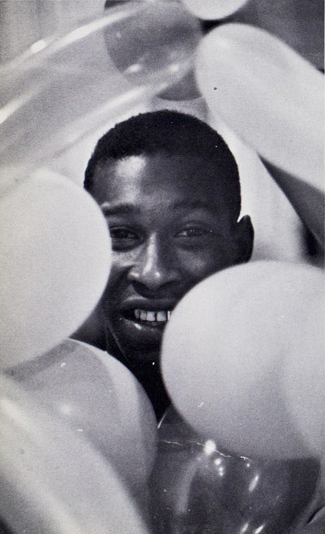 Furman University | Image
Furman University | ImageJoe Vaughn with balloons
Photograph from the 1966 Bonhomie (Furman Yearbook) of Joseph Vaughn '68 surrounded by balloons. Vaughn became the university's first African American student on Jan. 29, 1965.Learn more -
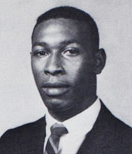 Furman University | Image
Furman University | ImageJoseph Vaughn yearbook photo
Class portrait from the 1966 Bonhomie (Furman Yearbook) of Joseph Vaughn '68. Vaughn became the university's first African American student on Jan. 29, 1965.Learn more -
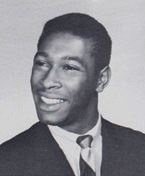 Furman University | Image
Furman University | ImageJoseph Vaughn yearbook photo
Class portrait from the 1967 Bonhomie (Furman Yearbook) of Joseph Vaughn '68. Vaughn became the university's first African American student on Jan. 29, 1965.Learn more -
 Furman University | Image
Furman University | ImageJoe Vaughn in 'The Firebugs'
Joseph Vaughn '68 and Linda Friddle '69 acting in the Furman Theater Guild's production of Max Frisch's comedy, 'The Firebugs.' Vaughn became the university's first African American student on Jan. 29, 1965.Learn more -
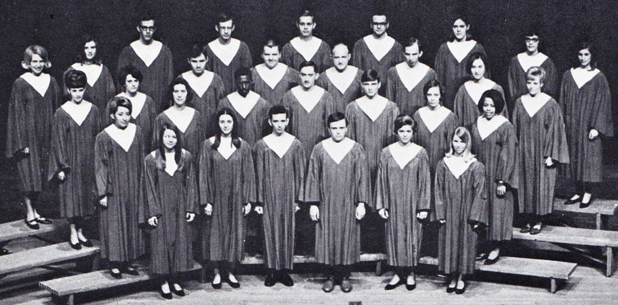 Furman University | Image
Furman University | ImageFurman Concert Choir
Joseph Vaughn '68 performing in the Furman Concert Choir. Vaughn became the university's first African American student on Jan. 29, 1965.Learn more -
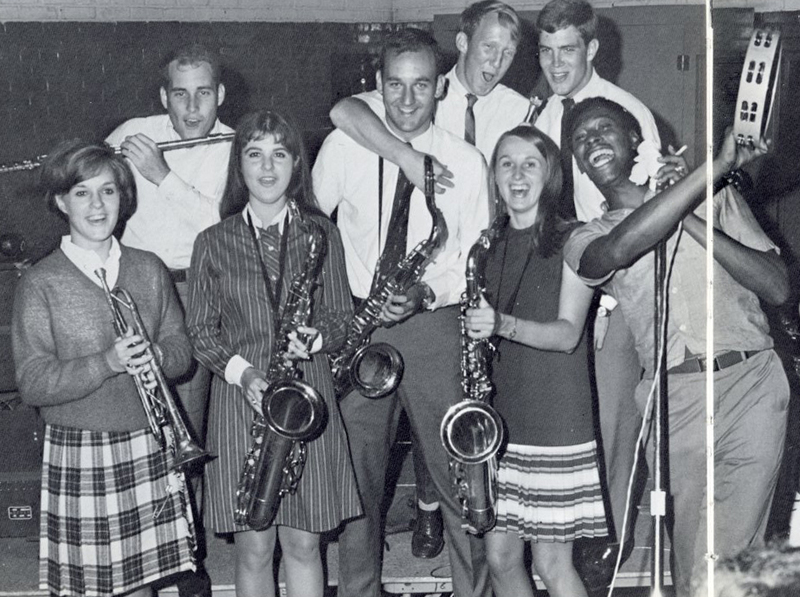 Furman University | Image
Furman University | ImageJoe Vaughn performing with classmates
Joseph Vaughn '68 and classmates having fun during a musical performance. Vaughn became the university's first African American student on Jan. 29, 1965.Learn more -
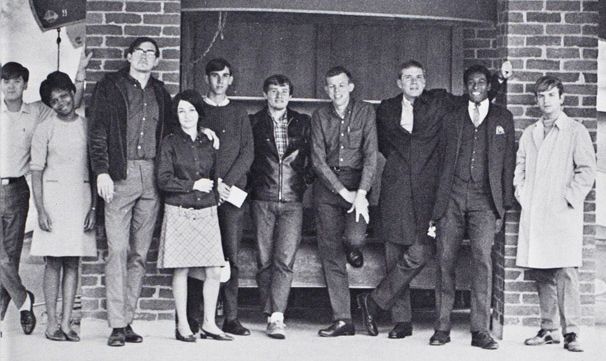 Furman University | Image
Furman University | ImageFurman Chapter of the Southern Student Organizing Committee
Photograph of the Furman Chapter of the Southern Student Organizing Committee, an organization of students committed to peace, racial equity, and participatory democracy. From the 1968 Furman yearbook: 'SSOC is convinced that society is in need of radical reform on every level, including the university level. It is our purpose to work for these reforms, both through education and direct action. Ready to organize are the members of the Southern Student Organizing Committee.Learn more -
 Furman University | Image
Furman University | ImageFurman Program Board
Photograph of the 1967-68 Furman University Program Board. The Program Board was an organization that sponsored the majority of activities provided by the Watkins Student Center. The Collegiate Education Service Corps, CESC, also functioned under the Program Board. It was one of the most worthwile and unique organizations in which Furman students could participate. From left to right in photo are Ms. Betty Alverson, Julie Burts, Karen Metcalfe, Joe Vaughn, Jan Clark, Harriet Hamrick, Chris Turner, and Ms. Juanita Copleland.Learn more -
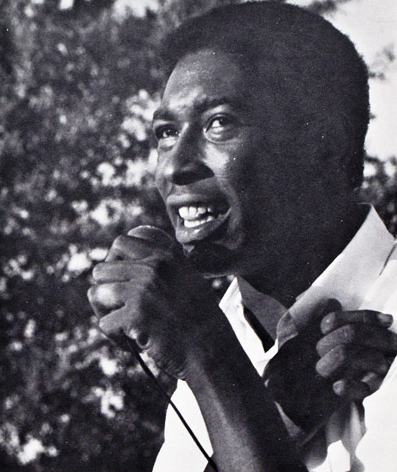 Furman University | Image
Furman University | ImageJoe Vaughn leading the cheer
Joseph Vaughn '68, as part of the Cheer Squad, leading fans in a cheer at one of the Furman football games. Vaughn became the university's first African American student on Jan. 29, 1965.Learn more -
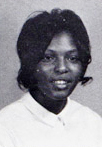 Furman University | Image
Furman University | ImageLillian Brock yearbook photo
Freshman Class portrait from the 1968 Bonhomie (Furman Yearbook) of Lillian Brock Flemming '71. Lillian Brock enrolled at Furman in 1967 as one of the university's first African American women.Learn more -
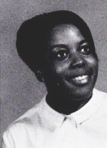 Furman University | Image
Furman University | ImageSarah Reese yearbook photo
Freshman Class portrait from the 1968 Bonhomie (Furman Yearbook) of Sarah Reese '71. Reese enrolled at Furman in 1967 as one of the university's first African American women.Learn more -
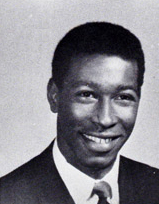 Furman University | Image
Furman University | ImageJoseph Vaughn yearbook photo
Senior Class portrait from the 1968 Bonhomie (Furman Yearbook) of Joseph Vaughn '68. Vaughn became the university's first African American student on Jan. 29, 1965.Learn more -
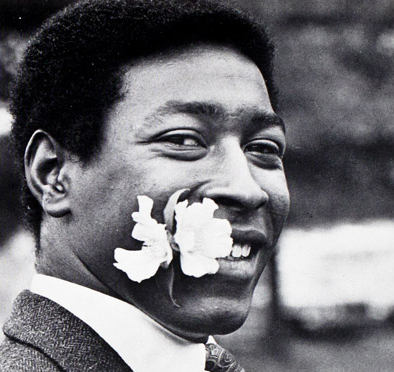 Furman University | Image
Furman University | ImageJoe Vaughn with flower
Photograph of Joseph Vaughn '68, holding a white azalea blossom in his teeth. Photo taken during his senior year at Furman. Vaughn became the university's first African American student on Jan. 29, 1965.Learn more -
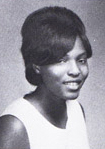 Furman University | Image
Furman University | ImageLillian Brock yearbook photo
Sophomore Class portrait from the 1969 Bonhomie (Furman Yearbook) of Lillian Brock Flemming '71. Lillian Brock enrolled at Furman in 1967 as one of the university's first African American women.Learn more -
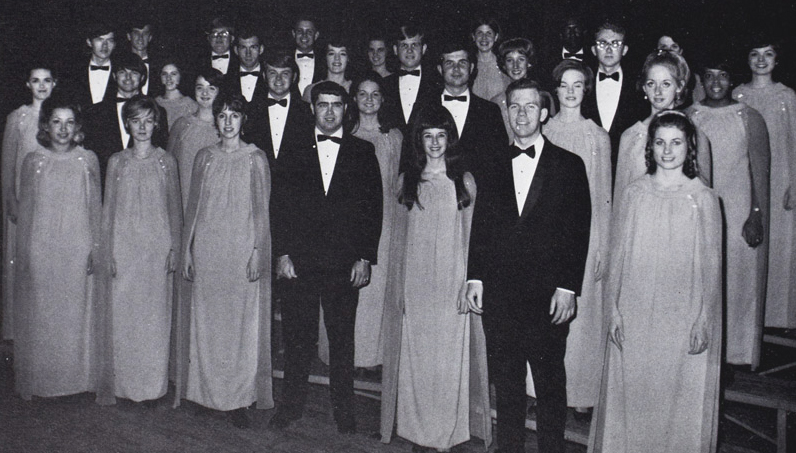 Furman University | Image
Furman University | ImageFurman Concert Choir
The 1969-1970 Furman University Concert Choir. A member of the choir, Sarah Reese '71, can be seen at the far right in photo, third row. Reese enrolled at Furman in 1967 as one of the university's first African American women. Sarah Reese would later become a world-famous opera singer.Learn more -
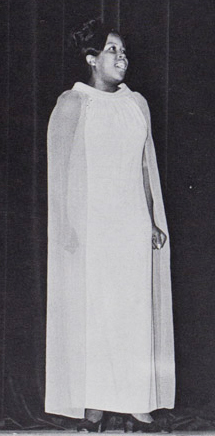 Furman University | Image
Furman University | ImageSarah Reese performing
Sarah Reese, in her Junior year at Furman, singing from the musical 'Porgy and Bess' as entertainment for the annual Knight's Night, during Homecoming week festivities. Reese enrolled at Furman in 1967 as one of the university's first African American women. Sarah Reese would later become a world-famous opera singer.Learn more -
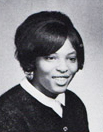 Furman University | Image
Furman University | ImageLillian Brock yearbook photo
Junior Class portrait from the 1970 Bonhomie (Furman Yearbook) of Lillian Brock Flemming '71. Lillian Brock enrolled at Furman in 1967 as one of the university's first African American women.Learn more -
 Furman University | Image
Furman University | ImageSarah Reese yearbook photo
Junior Class portrait from the 1970 Bonhomie (Furman Yearbook) of Sarah Reese '71. Reese enrolled at Furman in 1967 as one of the university's first African American women.Learn more -
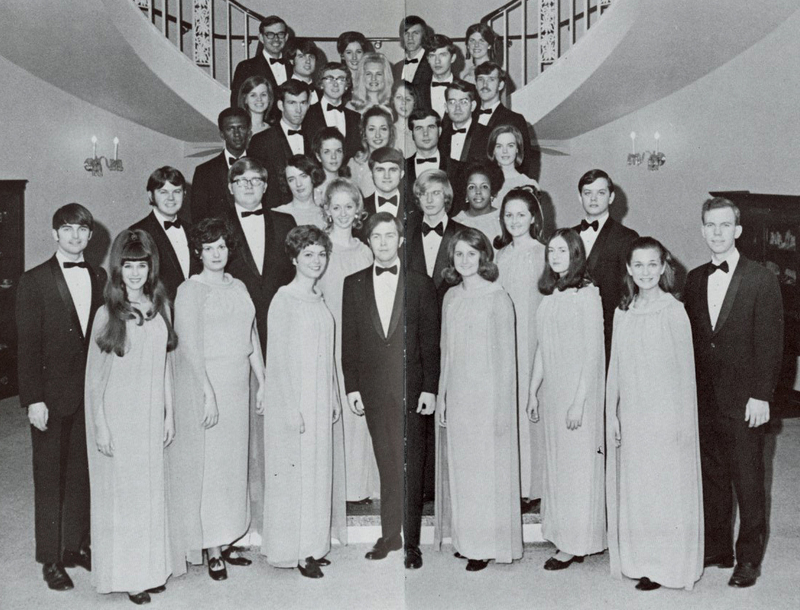 Furman University | Image
Furman University | ImageFurman Concert Choir
The 1970-1971 Furman University Concert Choir. Members of the choir include: Sarah Reese '71, in the third row, far right, and Ronald (Rawn) Harbor '71, in the fourth row, far left. Reese and Harbor were some of Furman's first African American students.Learn more -
 Furman University | Image
Furman University | ImageSarah Reese yearbook photo
Portrait of Sarah Reese '71 from the 'Who's Who' section of the 1971 Bonhomie (Furman Yearbook). Reese enrolled at Furman in 1967 as one of the university's first African American women.Learn more -
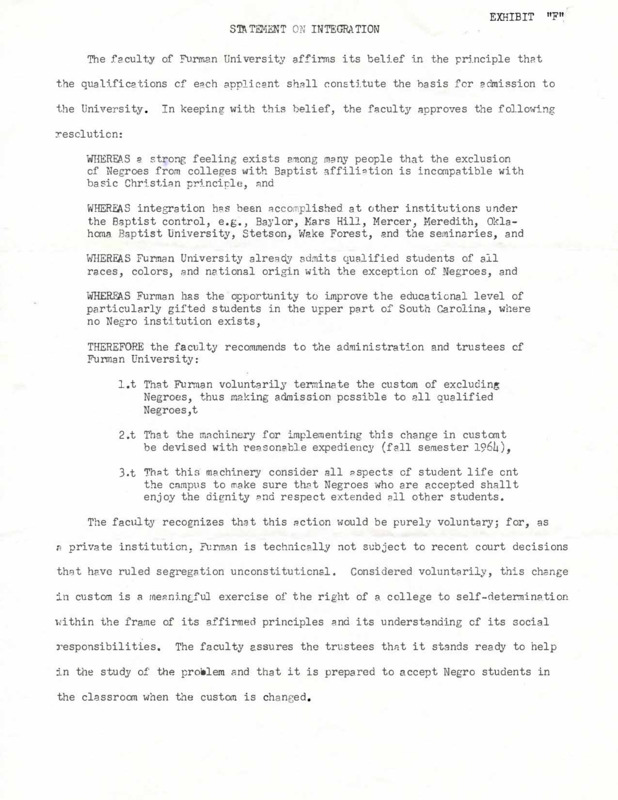 Furman University | Text
Furman University | TextStatement on Integration
A statement from the faculty of Furman University in support of integration, presented to the university's Board of Trustees on October 8, 1963.Learn more -
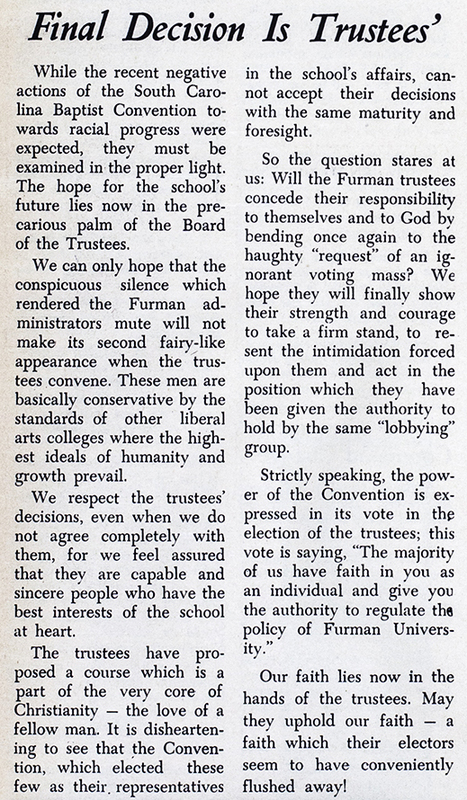 Furman University | Text
Furman University | TextFinal Decision Is Trustees'
An editorial appearing in Furman's student newspaper, The Paladin, dated November 16, 1963. The author is calling for the Furman Board of Trustees to be strong and not bend to the will of the South Carolina Baptist Convention.Learn more -
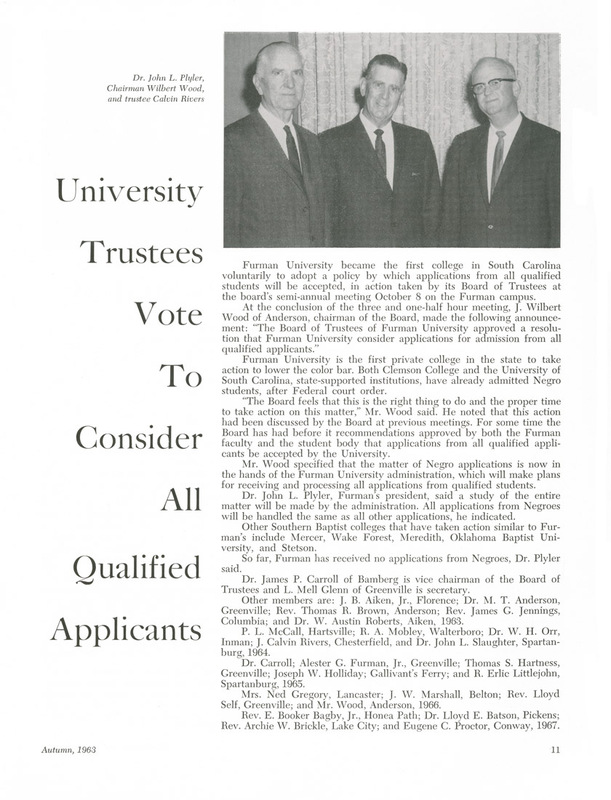 Furman University | Text
Furman University | TextUniversity Trustees Vote to Consider All Qualified Applicants
An article published in Furman Magazine, v. 12 (no. 3), Autumn 1963 about the semi-annual Furman Board of Trustees meeting, held october 8th, 1963, where the Board approved a resolution that Furman University consider applications for admission from all qualified applicants.Learn more -
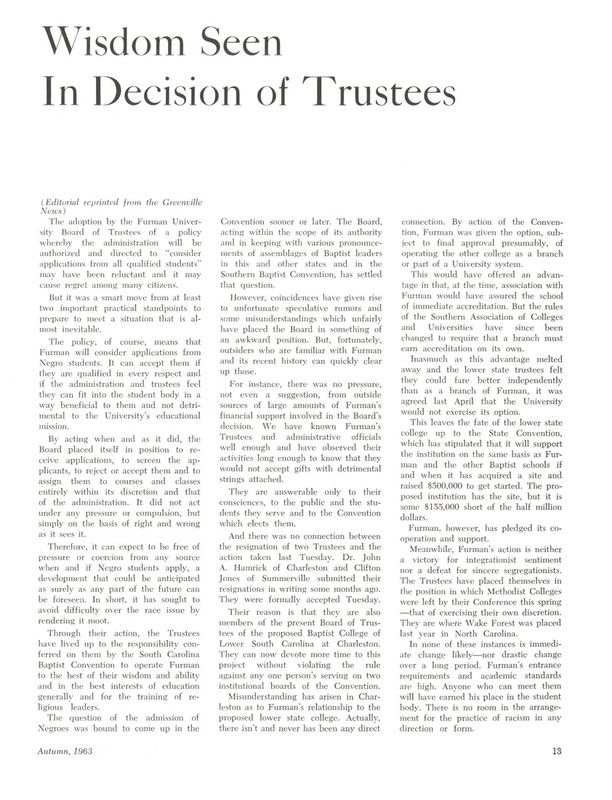 Furman University | Text
Furman University | TextWisdom Seen In Decision of Trustees
Editorial, reprinted from the Greenville News, published in Furman Magazine, v. 12 (no. 3), Autumn 1963. The author explains the wisdom in the Furman University Board of Trustees' adoption of a new policy allowing admission to all qualified students, regardless of race, and explains why it is wise for Southern Baptists, and other church-related colleges to support this decision.Learn more -
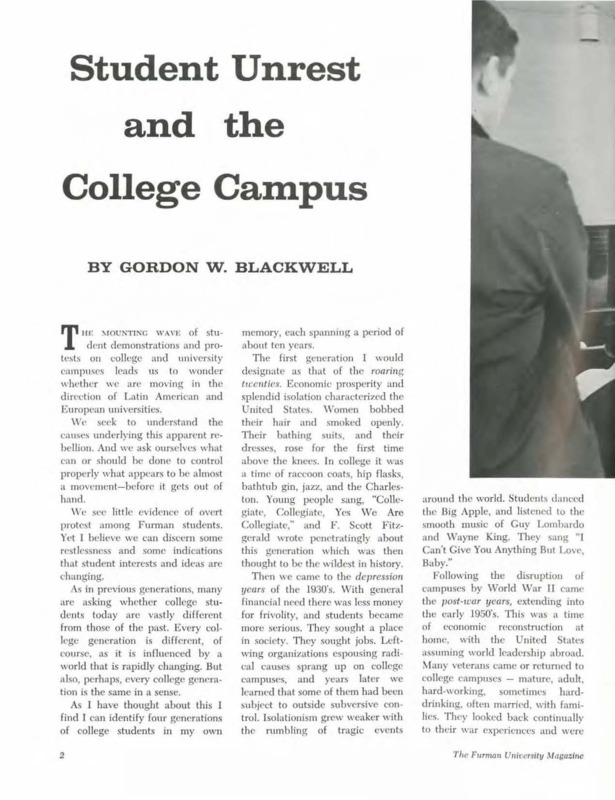 Furman University | Text
Furman University | TextStudent Unrest and the College Campus
An article written by Furman president, Gordon Blackwell, published in Furman Magazine, v. 14 (no. 3), Winter 1966. President Blackwell writes about the history of social change on college campuses thoughout the generations, as well as the current state of student unrest and social revolution at Furman in the 1960's.Learn more -
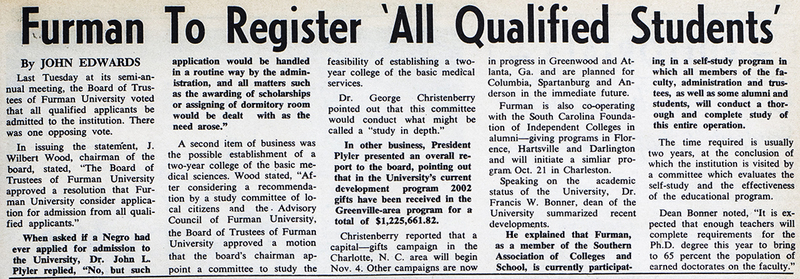 Furman University | Text
Furman University | TextFurman to Register 'All Qualified Students'
An article appearing in Furman's student newspaper, The Paladin, dated October 12, 1963, detailing a Furman Board of Trustees meeting, held October 8th, 1963, where the Board approved a resolution that Furman University consider applications for admission from all qualified applicants. The author also writes about other topics discussed in the meeting.Learn more -
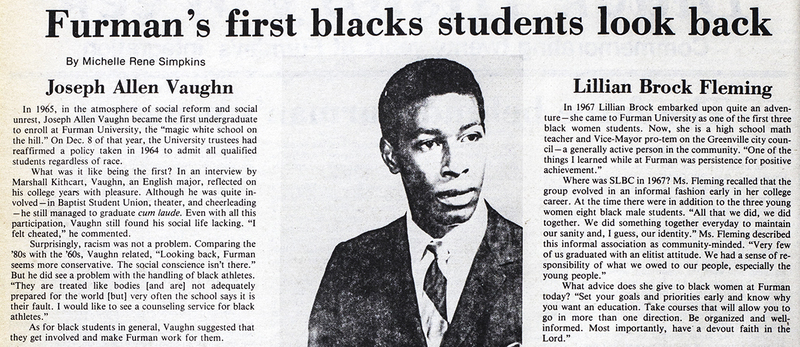 Furman University | Text
Furman University | TextFurman's First Black Students Look Back
An article appearing in Furman's student newspaper, The Paladin, dated February 8, 1985. In the article Joseph Vaughn '68, Furman University's first African American student, and Lillian Brock Flemming '71, one of the first two African American females to graduate Furman, reflect on their time at Furman, and offer advice to current African American students.Learn more -
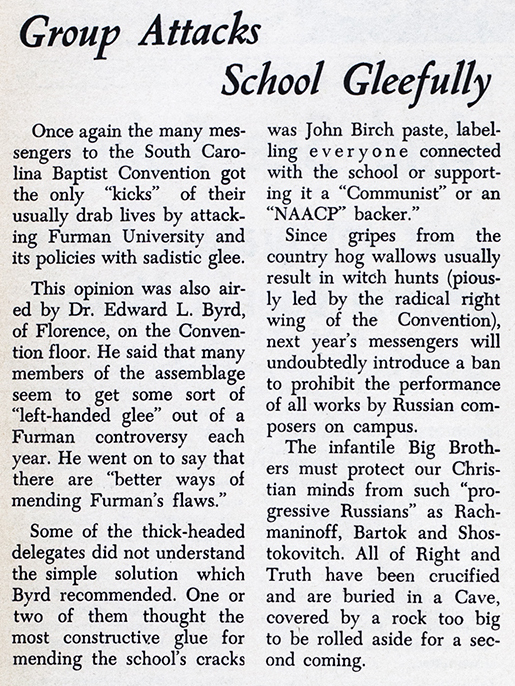 Furman University | Text
Furman University | TextGroup Attacks School Gleefully
An editorial appearing in Furman's student newspaper, The Paladin, dated November 16, 1963. The author is very critical of the South Carolina Baptist Convention and it's reaction to the Furman trustee's resolution authorizing Furman to admit all qualified applicants regardless of race or color.Learn more -
 Furman University | Text
Furman University | TextHornet Poll Tabulations Indicate Liberal Trend
Editorial in The Furman Hornet student newspaper, dated November 15, 1957. The editorial discusses freedom of public expression on campus, and the results of a recent anonymous 'Hornet Poll,' showing a 'relatively large number of students favoring total or partial racial integration.' A variety of questions and results about other issues Furman students face are also mentioned.Learn more -
 Furman University | Text
Furman University | TextMighty White Man
2-page color spread celebrating Mighty White Man, the horse ridden by the Paladin at Furman football games beginning in Fall 1961.Learn more -
 Furman University | Text
Furman University | TextMystical Bridge is Practical Divorcee
An article appearing in Furman's student newspaper, The Paladin, dated November 16, 1963. The author takes a satirical approach in describing a meeting of the South Carolina Baptist Convention and its reaction to the Furman Trustees' resolution authorizing Furman to admit all qualified applicants regardless of race or color.Learn more -
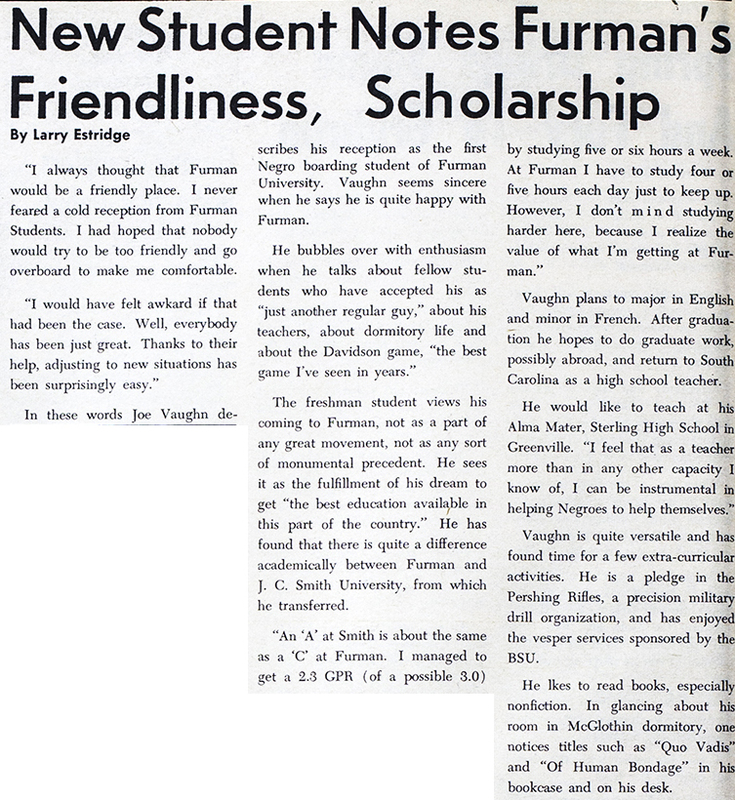 Furman University | Text
Furman University | TextNew Student Notes Furman's Friendliness, Scholarship
An article appearing in Furman's student newspaper, The Paladin, dated February 19, 1965. The article is about Joe Vaughn '68, his reception on campus, and his opinion of Furman after his first weeks there. Joseph Vaughn became the university's first African American student on Jan. 29, 1965.Learn more -
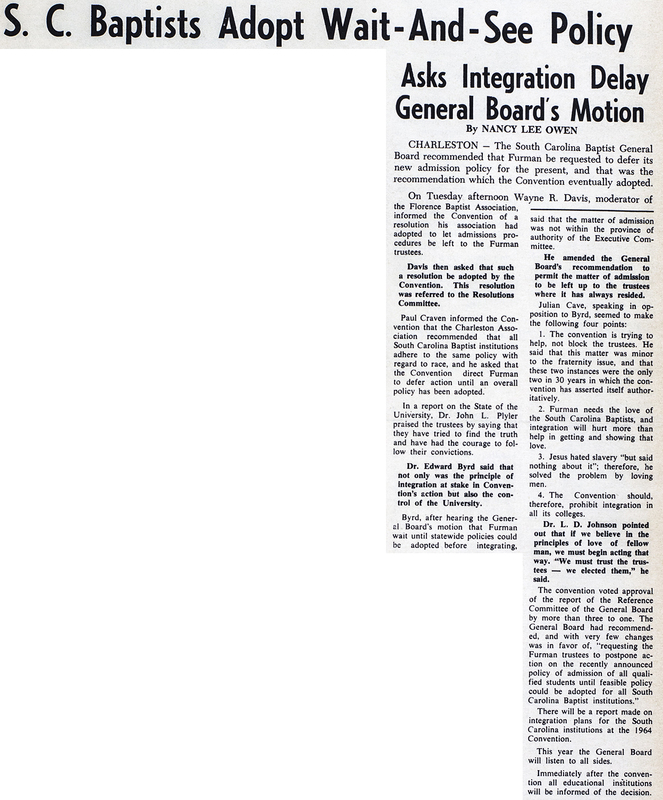 Furman University | Text
Furman University | TextS.C. Baptists Adopt Wait-and-See Policy, Asks Integration Delay General Board's Motion
An article appearing in Furman's student newspaper, The Paladin, dated November 16, 1963, detailing a meeting of the South Carolina Baptist Convention, and the Convention's approval of the General Board's request that the Furman University Trustees postpone action on the recently announced policy of admission of all qualified students until a feasible policy could be adopted for all South Carolina Baptist institutions.Learn more -
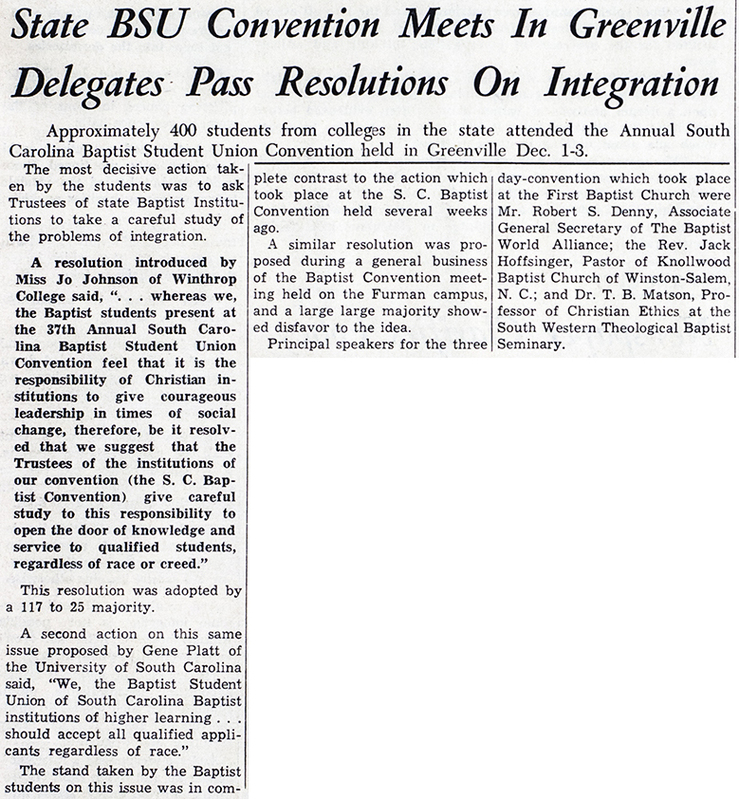 Furman University | Text
Furman University | TextState BSU Covention Meets in Greenville: Delegates Pass Resolution on Integration
An article appearing in Furman's student newspaper, The Paladin, dated November 11, 1961. The article details a resolution, introduced, and approved at the Annual South Carolina Baptist Student Union Convention, suggesting that the Trustees of the institutions of the South Carolina Baptist Convention 'give careful study to this responsibilty to open the door' to qualified students regardless of race.Learn more -
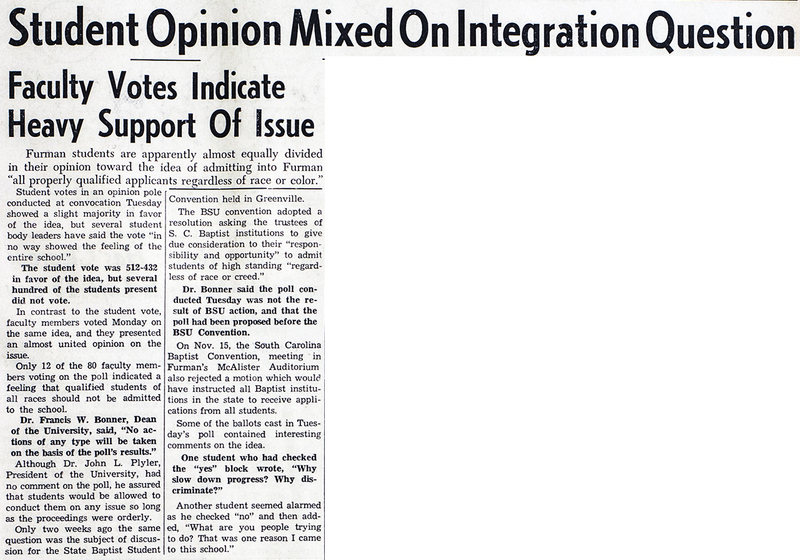 Furman University | Text
Furman University | TextStudent Opinion Mixed on Integration: Faculty Votes Indicate Heavy Support of Issue
An article appearing in Furman's student newspaper, The Paladin, dated December 15, 1961. The article includes the results of a recent opinion poll given to the students and faculty seeking their thoughts on the idea of admitting into Furman 'all properly qualified applicants regardless of race or color.'Learn more -
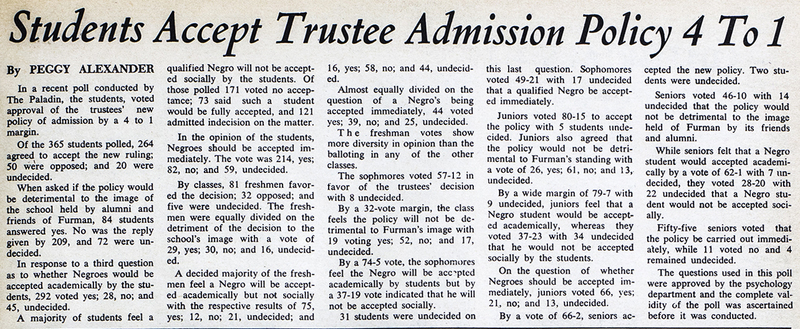 Furman University | Text
Furman University | TextStudents Accept Trustee Admission Policy 4 to 1
An article appearing in Furman's student newspaper, The Paladin, dated November 9, 1963, showing the results of a poll given to Furman students, seeking their opinions on the Furman Trustees' resolution authorizing Furman to admit all qualified applicants regardless of race or color.Learn more -
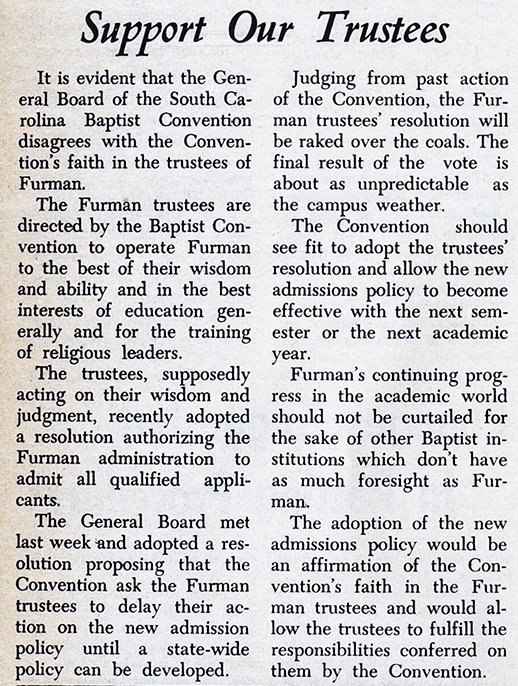 Furman University | Text
Furman University | TextSupport Our Trustees
An editorial appearing in Furman's student newspaper, The Paladin, dated October 26, 1963, written in support of the Furman Board of Trustees' recently approved resolution that Furman University consider applications for admission from all qualified applicants. The writer is in support of acting on the Trustee's resolution the next semester, and is against a resolution by the General Board of the South Carolina Baptist convention requesting a delay.Learn more -
 Centre College | Moving Image
Centre College | Moving ImageOral history interview with Gordon and Pat Benning
Video interview with Gordon Benning, class of 1970. and his wife, Pat Benning. Mr. Benning enrolled at Centre College in 1966, just two years after the College officially integrated in 1964. Mrs. Benning, is a Danville, Ky. native, and the two dated while Mr. Benning attended Centre.Learn more -
 Centre College | Moving Image
Centre College | Moving ImageOral history interview with Raymond Burse
Video interview with Raymond Burse, who graduated from Centre College in 1973. Mr. Burse is a distinguished Rhodes Scholar, studied organic chemistry at Oxford, and attended Harvard Law School. He has been a member of the Centre College Board of Trustees and the president of Kentucky State University.Learn more -
 Centre College | Moving Image
Centre College | Moving ImageOral history interview with Jim Davis
Video interview with Jim Davis, one of the first three African Americans to attend Centre College. Mr. Davis enrolled at Centre College in the fall of 1964 as the only African American male. He graduated in 1968.Learn more -
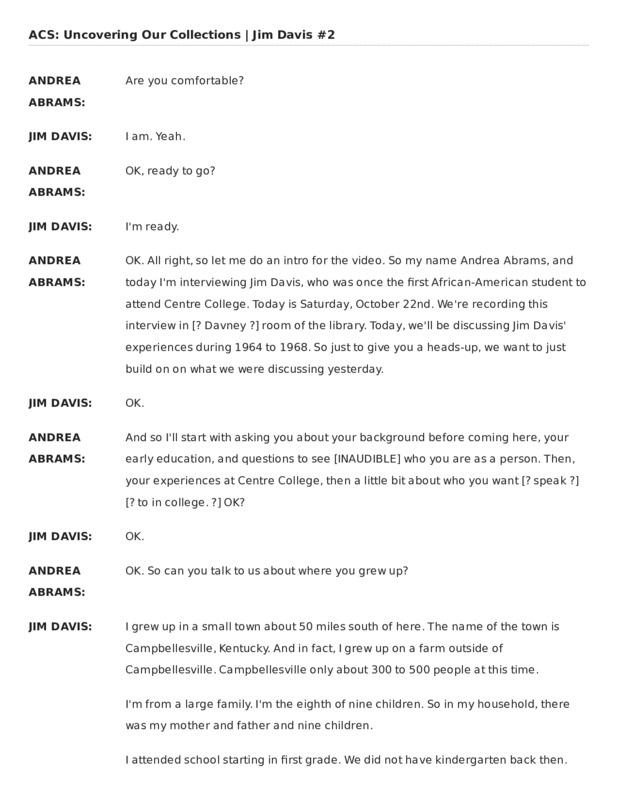 Centre College | Text
Centre College | TextOral history interview with Jim Davis : transcript
Written transcription of the oral history interview with Jim Davis, one of the first three African Americans to attend Centre College. Mr. Davis enrolled at Centre College in the fall of 1964 as the only African American male. He graduated in 1968.Learn more -
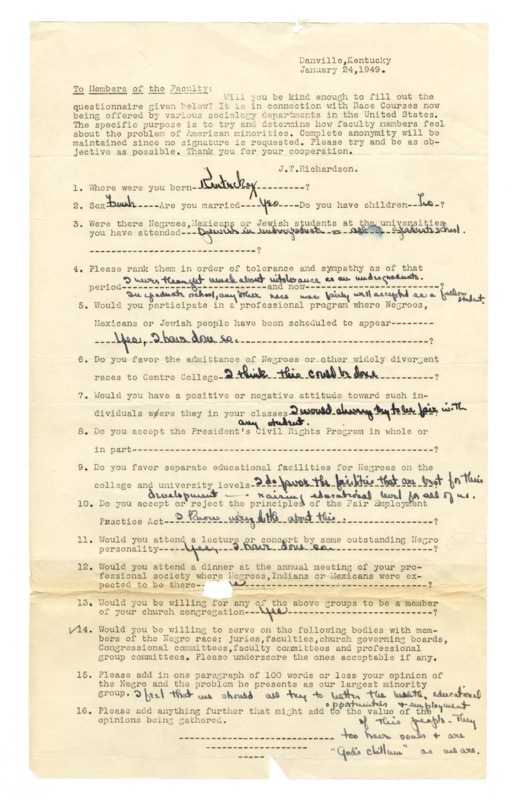 Centre College | Text
Centre College | TextAmerican minorities faculty questionnaire (1)
Anonymous responses to a questionnaire distributed to Centre College faculty January 24, 1949, the stated purpose of which was "to try an determine how faculty members feel about the problem of American minorities."Learn more -
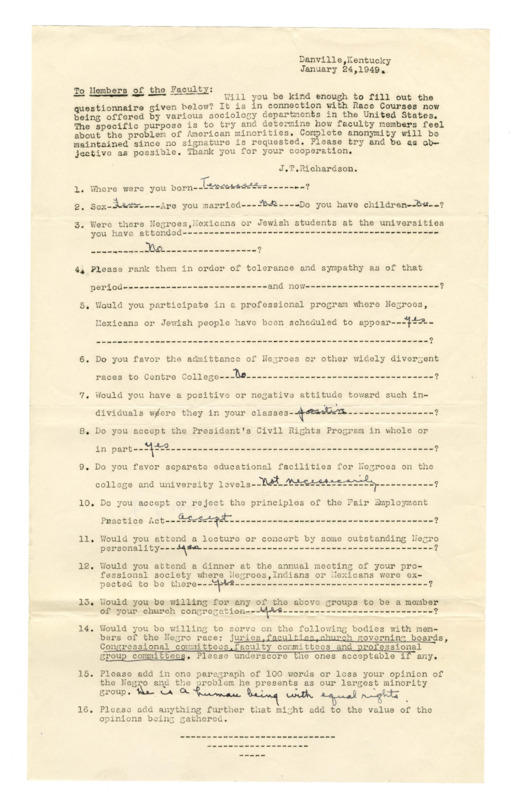 Centre College | Text
Centre College | TextAmerican minorities faculty questionnaire (2)
Anonymous responses to a questionnaire distributed to Centre College faculty January 24, 1949, the stated purpose of which was "to try an determine how faculty members feel about the problem of American minorities."Learn more -
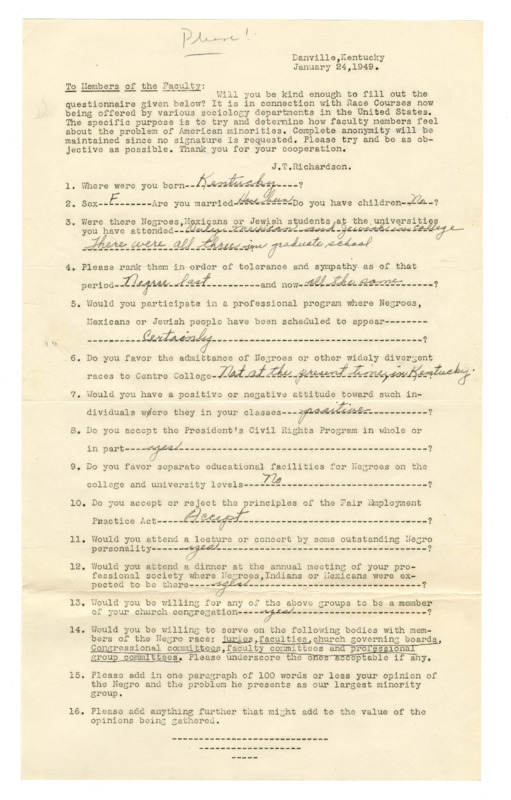 Centre College | Text
Centre College | TextAmerican minorities faculty questionnaire (3)
Anonymous responses to a questionnaire distributed to Centre College faculty January 24, 1949, the stated purpose of which was "to try an determine how faculty members feel about the problem of American minorities."Learn more -
 Centre College | Text
Centre College | TextAmerican minorities faculty questionnaire (4)
Anonymous responses to a questionnaire distributed to Centre College faculty January 24, 1949, the stated purpose of which was "to try an determine how faculty members feel about the problem of American minorities."Learn more -
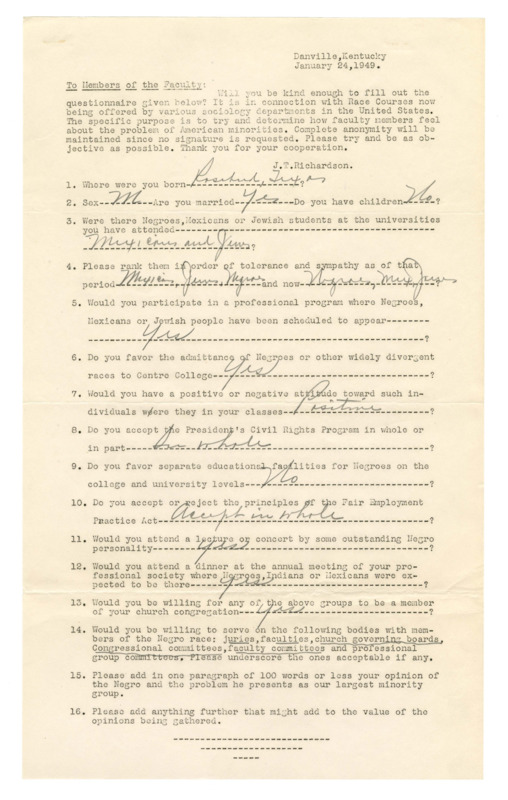 Centre College | Text
Centre College | TextAmerican minorities faculty questionnaire (5)
Anonymous responses to a questionnaire distributed to Centre College faculty January 24, 1949, the stated purpose of which was "to try an determine how faculty members feel about the problem of American minorities."Learn more -
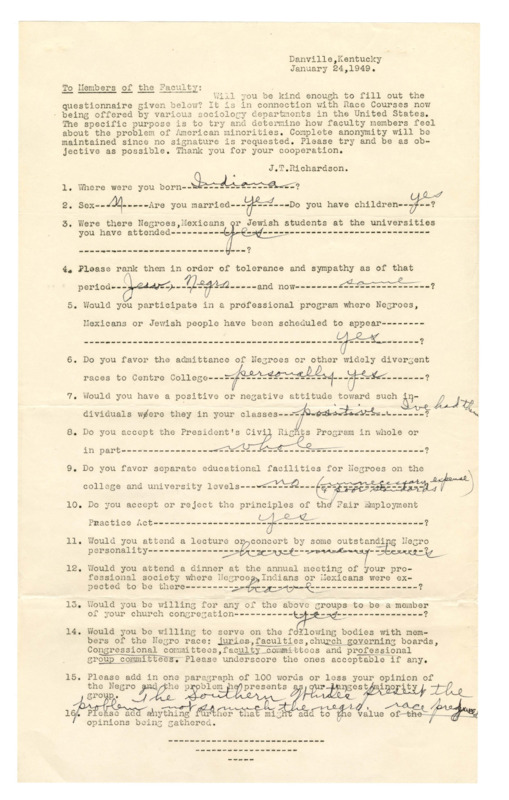 Centre College | Text
Centre College | TextAmerican minorities faculty questionnaire (6)
Anonymous responses to a questionnaire distributed to Centre College faculty January 24, 1949, the stated purpose of which was "to try an determine how faculty members feel about the problem of American minorities."Learn more -
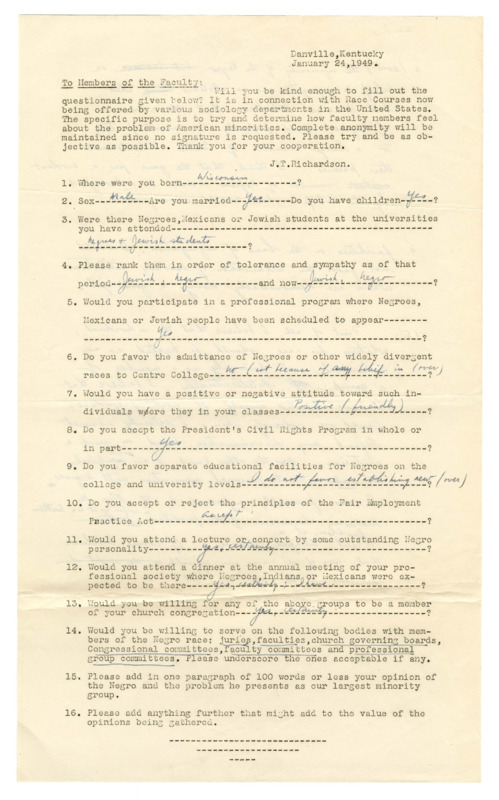 Centre College | Text
Centre College | TextAmerican minorities faculty questionnaire (7)
Anonymous responses to a questionnaire distributed to Centre College faculty January 24, 1949, the stated purpose of which was "to try an determine how faculty members feel about the problem of American minorities."Learn more -
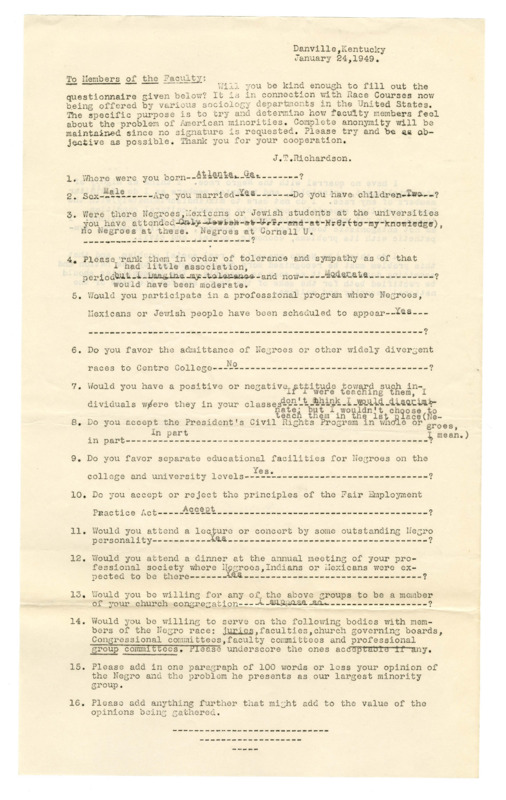 Centre College | Text
Centre College | TextAmerican minorities faculty questionnaire (8)
Anonymous responses to a questionnaire distributed to Centre College faculty January 24, 1949, the stated purpose of which was "to try an determine how faculty members feel about the problem of American minorities."Learn more -
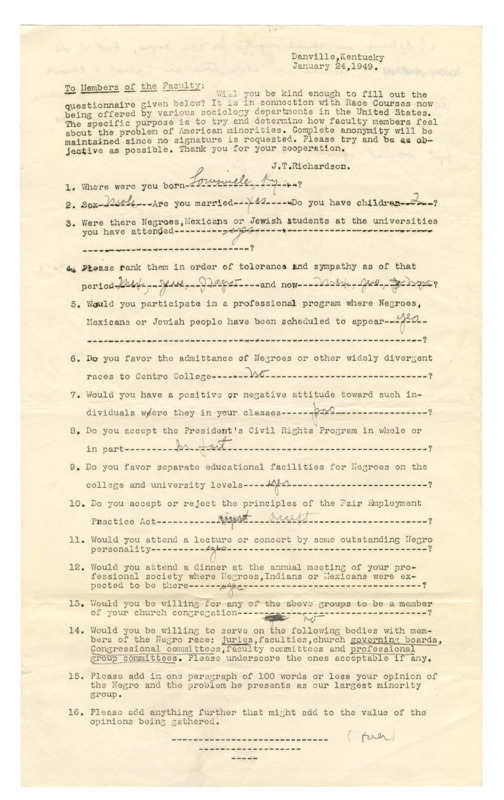 Centre College | Text
Centre College | TextAmerican minorities faculty questionnaire (9)
Anonymous responses to a questionnaire distributed to Centre College faculty January 24, 1949, the stated purpose of which was "to try an determine how faculty members feel about the problem of American minorities."Learn more -
 Centre College | Text
Centre College | TextAmerican minorities faculty questionnaire (10)
Anonymous responses to a questionnaire distributed to Centre College faculty January 24, 1949, the stated purpose of which was "to try an determine how faculty members feel about the problem of American minorities."Learn more -
 Centre College | Text
Centre College | TextAmerican minorities faculty questionnaire (11)
Anonymous responses to a questionnaire distributed to Centre College faculty January 24, 1949, the stated purpose of which was "to try an determine how faculty members feel about the problem of American minorities."Learn more -
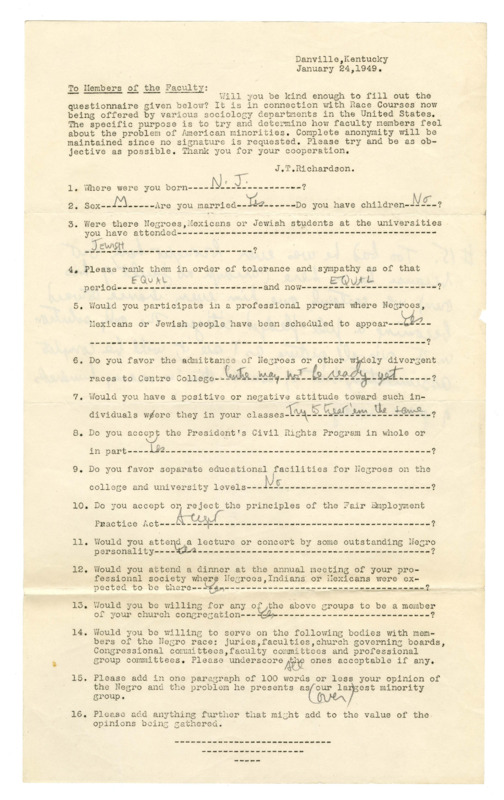 Centre College | Text
Centre College | TextAmerican minorities faculty questionnaire (12)
Anonymous responses to a questionnaire distributed to Centre College faculty January 24, 1949, the stated purpose of which was "to try an determine how faculty members feel about the problem of American minorities."Learn more -
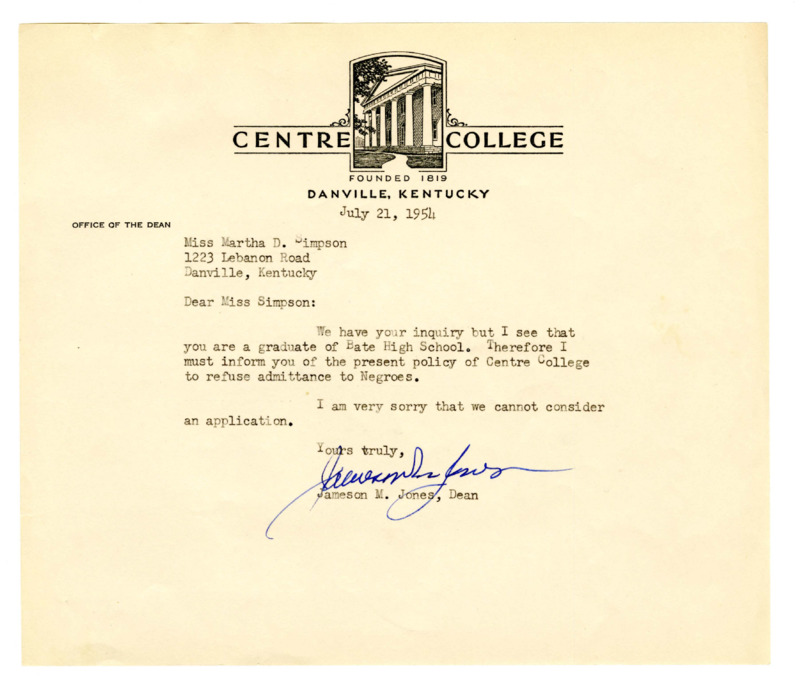 Centre College | Text
Centre College | TextMartha D. Simpson rejection letter
Letter from Centre College Dean Jameson M. Jones to Ms. Martha D. Simpson, dated July 21, 1954, in which he rejects her application for admission to Centre College based upon the fact that Ms. Simpson was a graduate of Bate High School, an all-black school in Danville, and therefore assumed to be a person of color and thus not eligible for admissionLearn more -
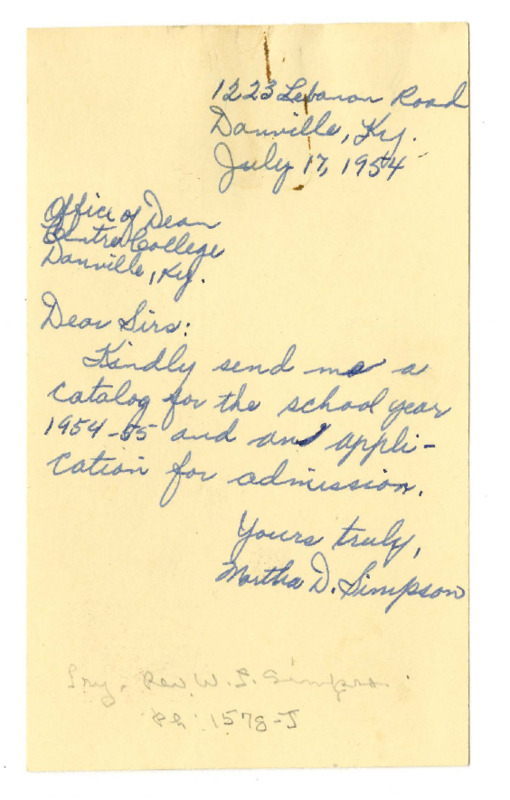 Centre College | Text
Centre College | TextMartha D. Simpson application request letter
Letter from Ms. Martha D. Simpson of Danville, KY, dated July 17, 1954, to the Centre College Office of the Dean, requesting a college catalog and application for admissionLearn more -
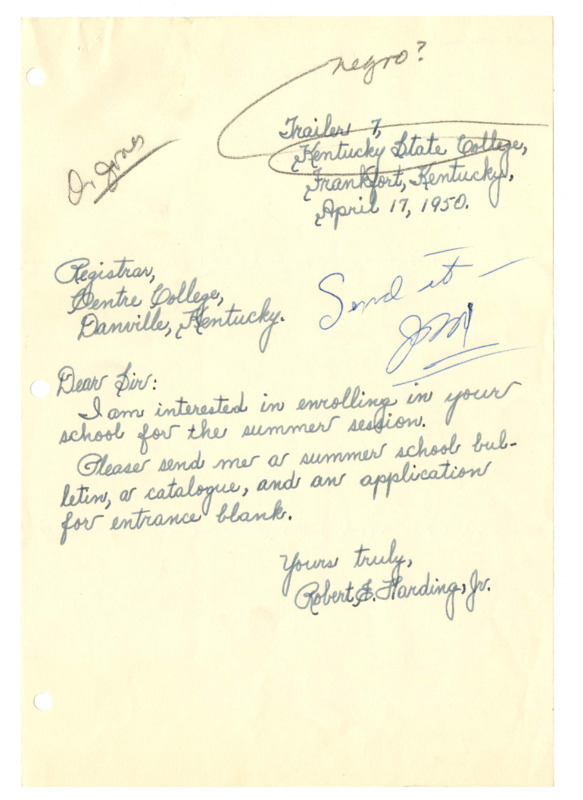 Centre College | Text
Centre College | TextRobert E. Harding, Jr. application request letter
Letter from Mr. Robert E. Harding, Jr., a student at Kentucky State University in Frankfort, KY, dated April 17, 1950, to the Centre College Registrar, requesting application materials for the summer sessionLearn more -
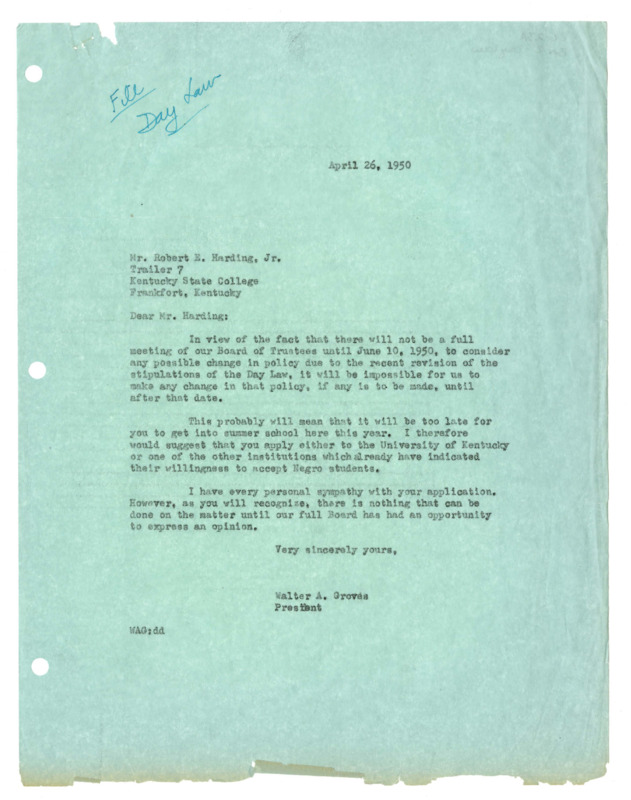 Centre College | Text
Centre College | TextRobert E. Harding, Jr. rejection letter
Letter from Centre College President Walter A. Groves to Mr. Robert E. Harding, dated April 26, 1950, in which Groves rejects Harding's request for application materials for the summer session based upon the fact that Mr. Harding was a student at Kentucky State College, an all-black college in Frankfort, KY, and therefore assumed to be a person of color and thus not eligible for admissionLearn more -
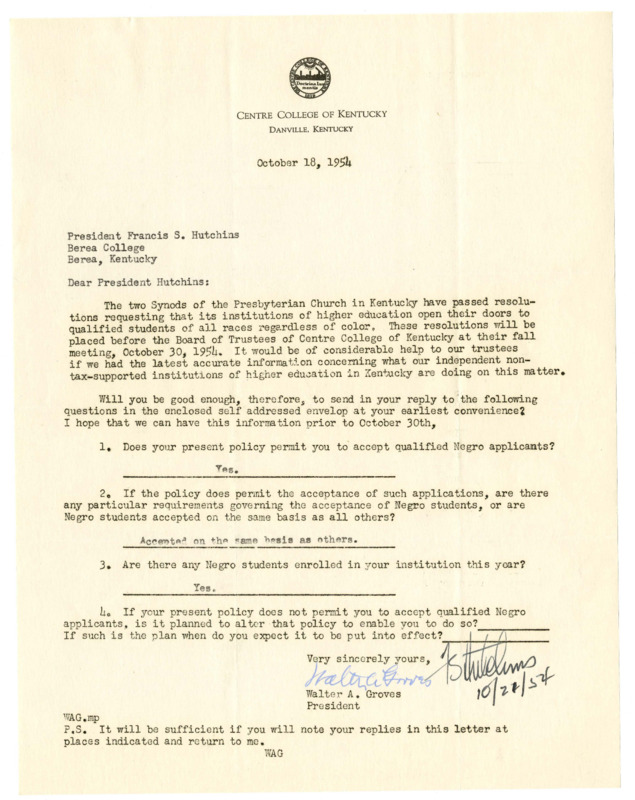 Centre College | Text
Centre College | TextRace policies questionnaire (Berea)
Letter from Centre College President Walter A. Groves, dated October 18, 1954, to Berea College President Francis S. Hutchins inquiring as to Berea's policies on admitting students of color, and Berea's responseLearn more -
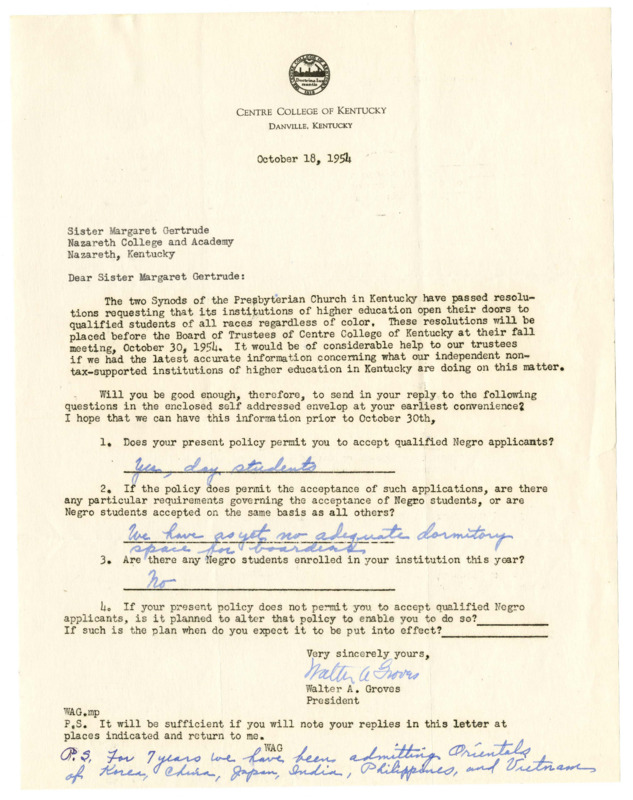 Centre College | Text
Centre College | TextRace policies questionnaire (Nazareth College and Academy)
Letter from Centre College President Walter A. Groves, dated October 18, 1954, to Nazareth College and Academy President Sister Margaret Gertrude inquiring as to Nazareth's policies on admitting students of color, and Nazareth's responseLearn more -
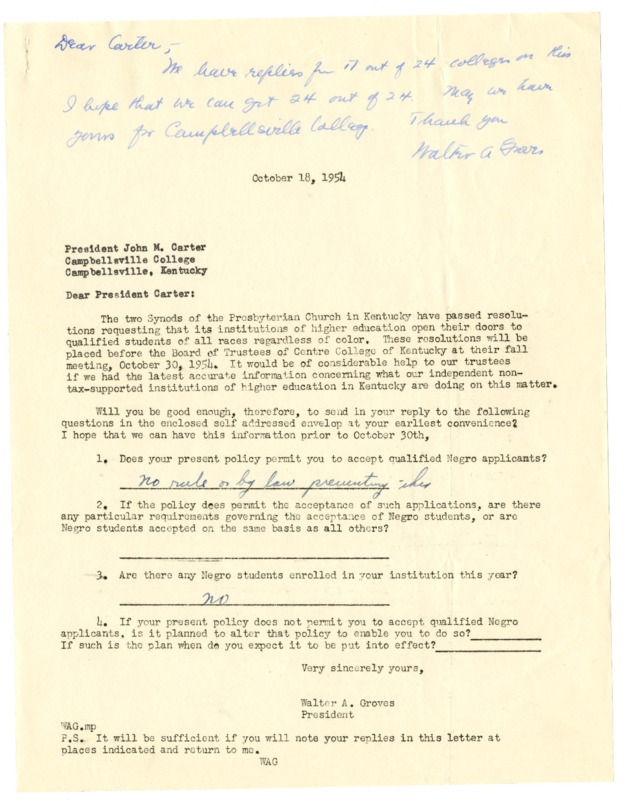 Centre College | Text
Centre College | TextRace policies questionnaire (Campbellsville College)
Letter from Centre College President Walter A. Groves, dated October 18, 1954, to Campbellsville President John M. Carter inquiring as to Campbellsville's policies on admitting students of color, and Campbellsville's responseLearn more -
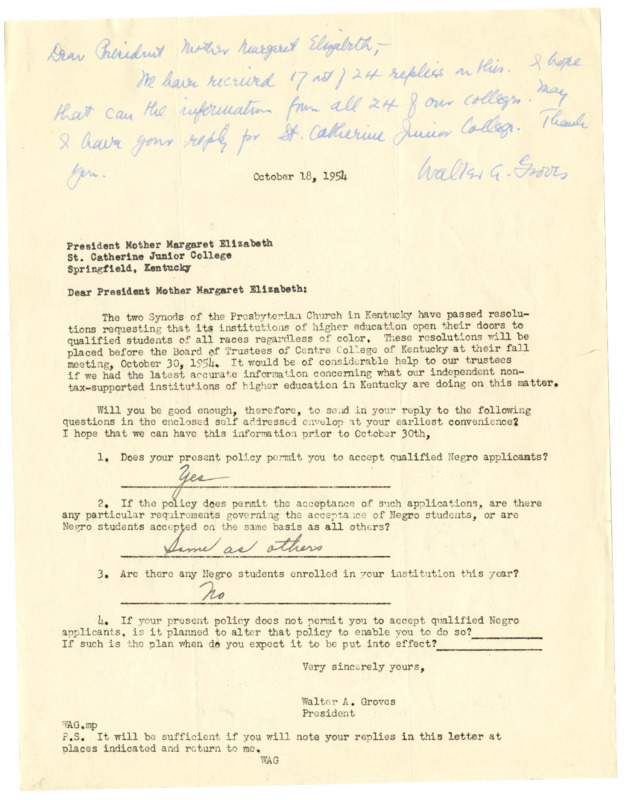 Centre College | Text
Centre College | TextRace policies questionnaire (St. Catherine Junior College)
Letter from Centre College President Walter A. Groves, dated October 18, 1954, to St. Catherine Junior College President Mother Margaret Elizabeth inquiring as to St. Catherine's policies on admitting students of color, and St. Catherine's responseLearn more -
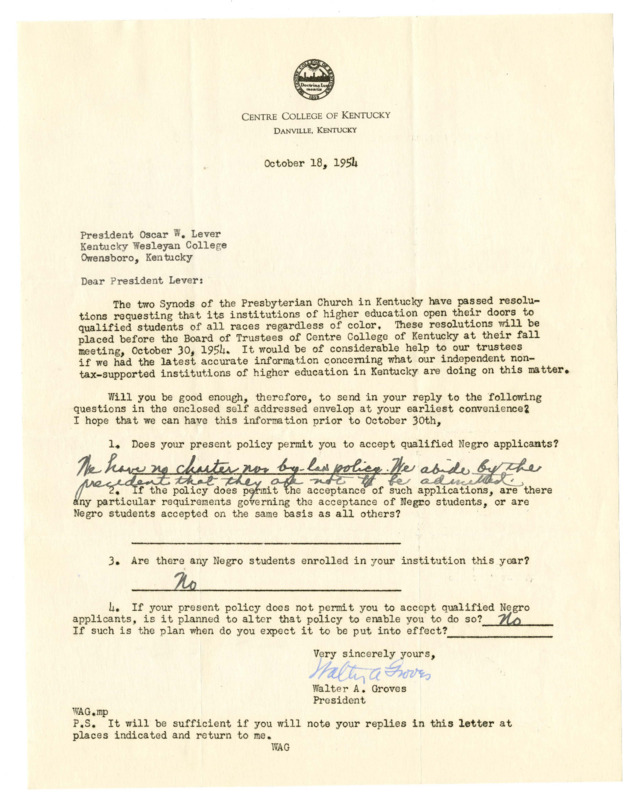 Centre College | Text
Centre College | TextRace policies questionnaire (Kentucky Wesleyan College)
Letter from Centre College President Walter A. Groves, dated October 18, 1954, to Kentucky Wesleyan College President Oscar W. Lever inquiring as to Kentucky Wesleyan's policies on admitting students of color, and Kentucky Wesleyan's responseLearn more -
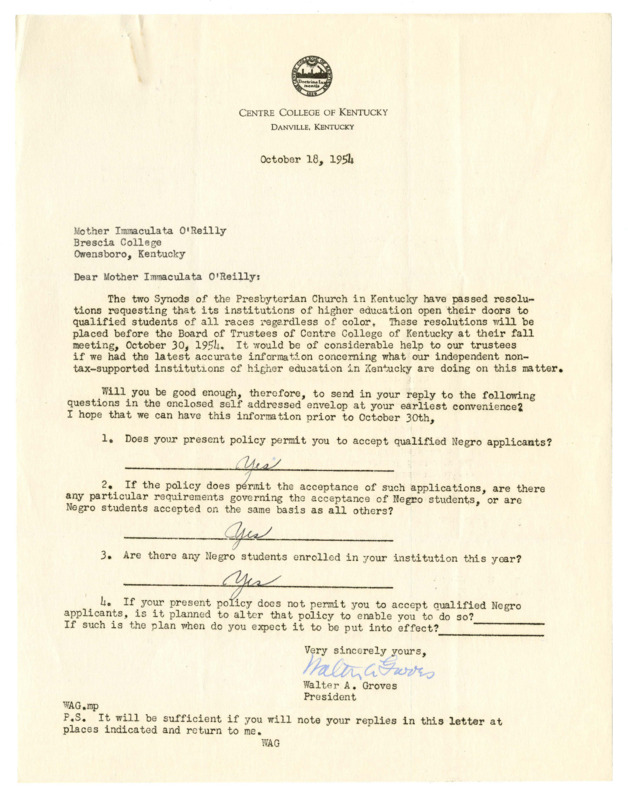 Centre College | Text
Centre College | TextRace policies questionnaire (Brescia College)
Letter from Centre College President Walter A. Groves, dated October 18, 1954, to Brescia College President Mother Immaculata O'Reilly inquiring as to Brescia's policies on admitting students of color, and Brescia's responseLearn more -
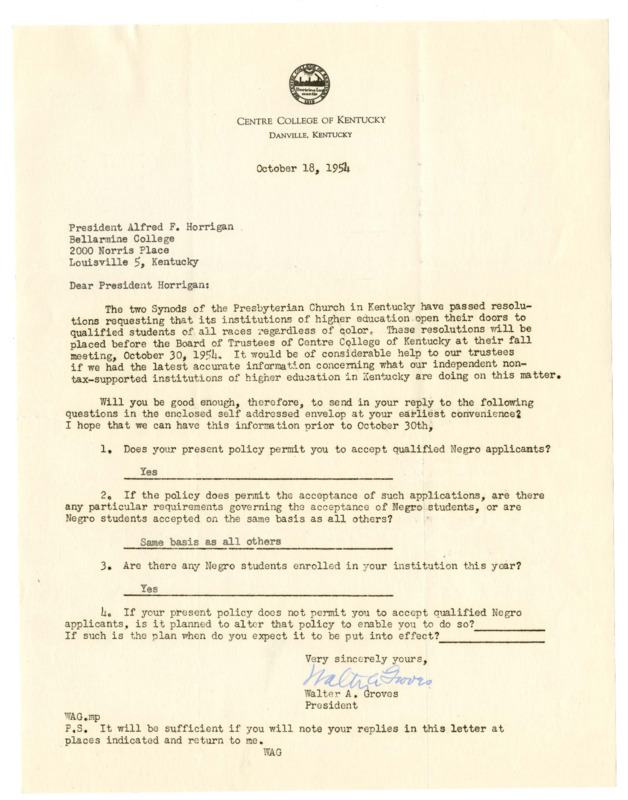 Centre College | Text
Centre College | TextRace policies questionnaire (Bellarmine College)
Letter from Centre College President Walter A. Groves, dated October 18, 1954, to Bellarmine College President Alfred F. Horrigan inquiring as to Bellarmine's policies on admitting students of color, and Bellarmine's responseLearn more -
 Centre College | Text
Centre College | TextRace policies questionnaire (Georgetown College)
Letter from Centre College President Walter A. Groves, dated October 18, 1954, to Georgetown College President H. Leo Eddleman inquiring as to Georgetown's policies on admitting students of color, and Georgetown's responseLearn more -
 Centre College | Text
Centre College | TextLetter from Conway Boatman to Walter A. Groves stating Union College's present policy on admitting persons of color
Letter from Conway Boatman to Walter A. Groves regarding Union College's policy on raceLearn more -
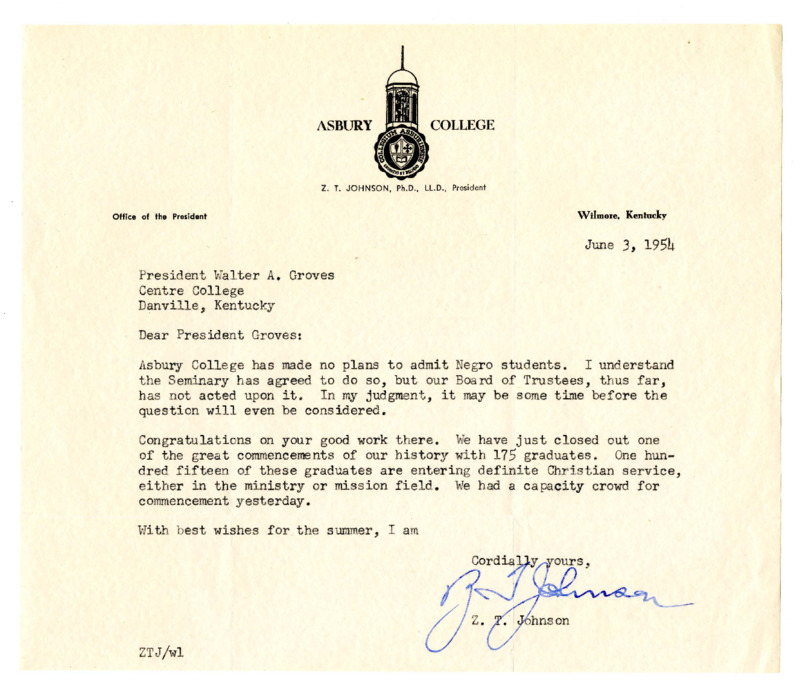 Centre College | Text
Centre College | TextLetter from Z. T. Johnson to Walter A. Groves stating Asbury College's present policy on admitting persons of color
Letter from Z. T. Johnson to Walter A. Groves regarding Asbury College's policy on raceLearn more -
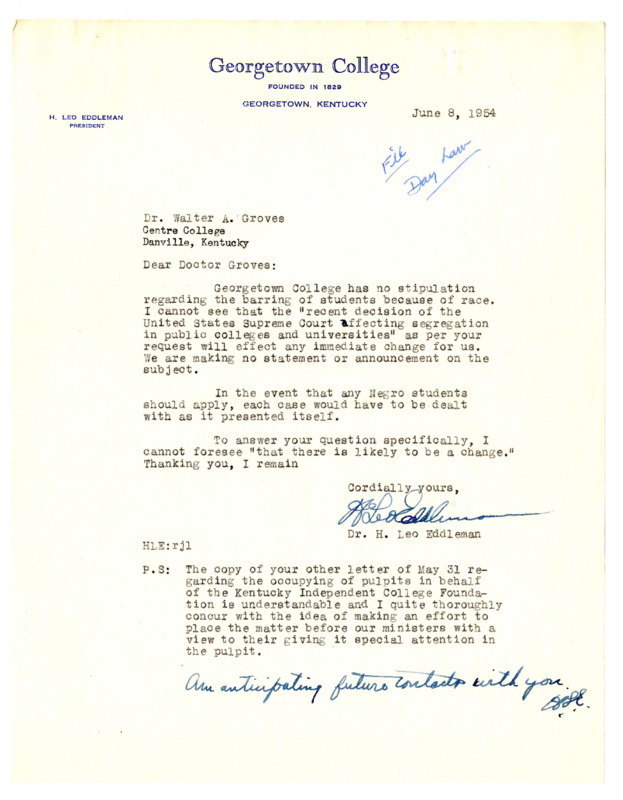 Centre College | Text
Centre College | TextLetter from H. Leo Eddleman to Walter A. Groves stating Georgetown College's present policy on admitting persons of color
Letter from H. Leo Eddleman to Walter A. Groves regarding Georgetown College's policy on raceLearn more -
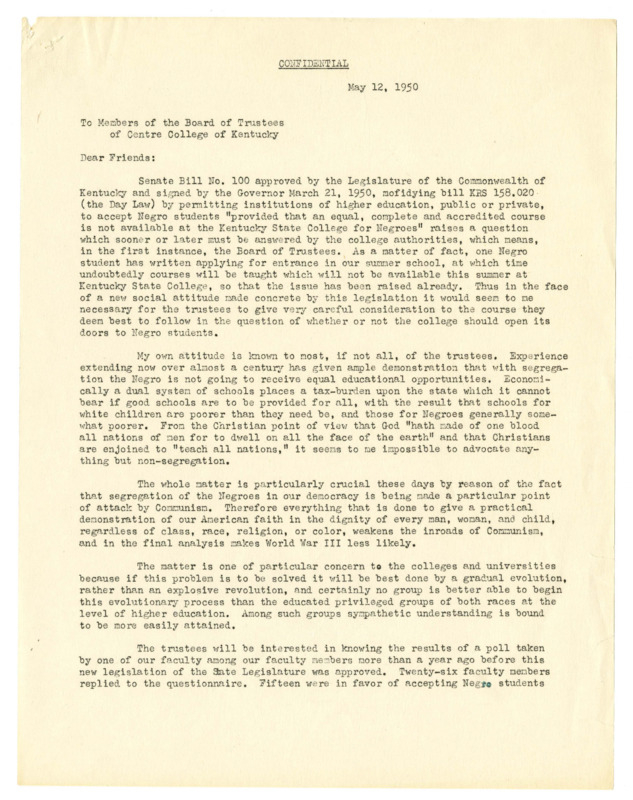 Centre College | Text
Centre College | TextLetter from Walter A. Groves to the Centre College Board of Trustees, May 12, 1950
Letter from President Groves, dated May 12, 1950, to the B.O.T. in which Groves entreats the Board to "give very careful consideration to the course they deem best to follow in the question of whether or not the college should open its doors to Negro students." Groves references Senate Bill No. 100, states his own desire to integrate the College slowly, and references the American minorities faculty questionnaire distributed in January 1949, the results of which showed a majority of faculty respondents in favor of desegregationLearn more -
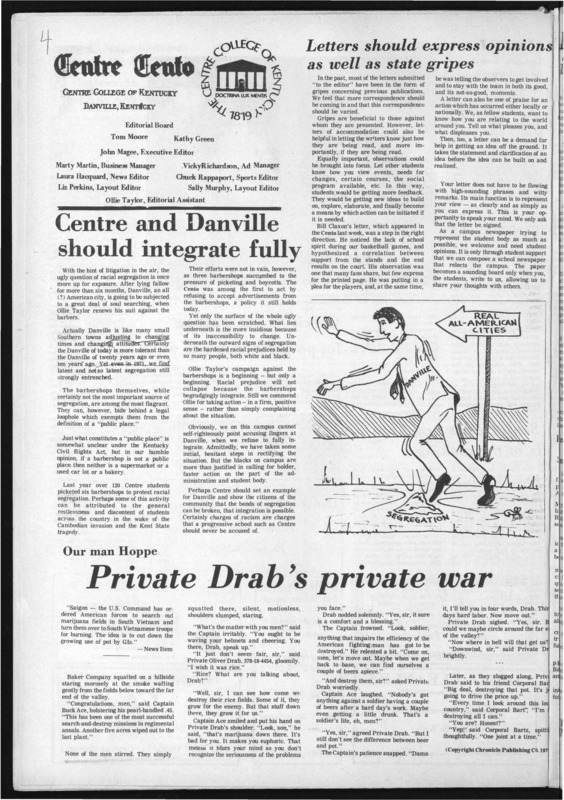 Centre College | Text
Centre College | TextCentre and Danville should integrate fully
Opinion piece regarding the picketing of segregated barbershops. Also commends student Ollie Taylor’s campaign, as well as pointing out that Centre should be an example for Danville as to what integration looks like. Includes corresponding cartoon.Learn more -
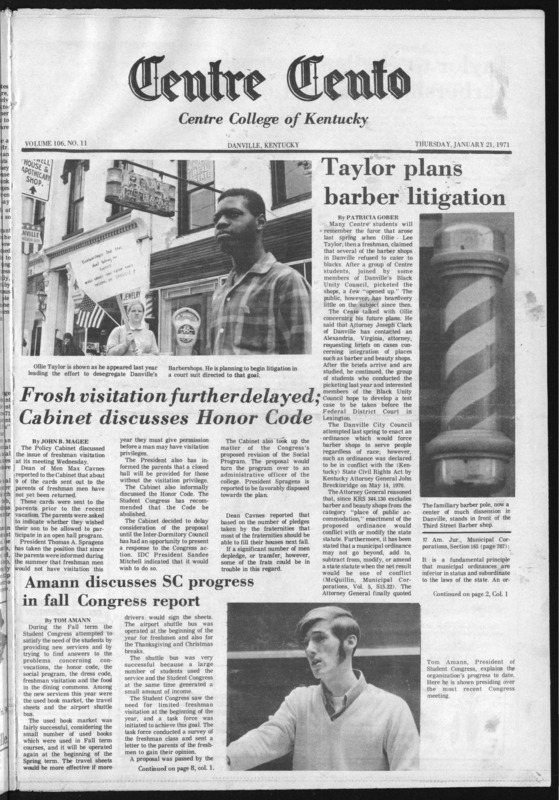 Centre College | Text
Centre College | TextTaylor Plans Barber Litigation
An article about Ollie Taylor, a Centre student who led the efforts to desegregate Danville barbershops the previous spring. The Cento staff interviewed Taylor to get updates on the current situation as well interviewing other students on their opinions.Learn more -
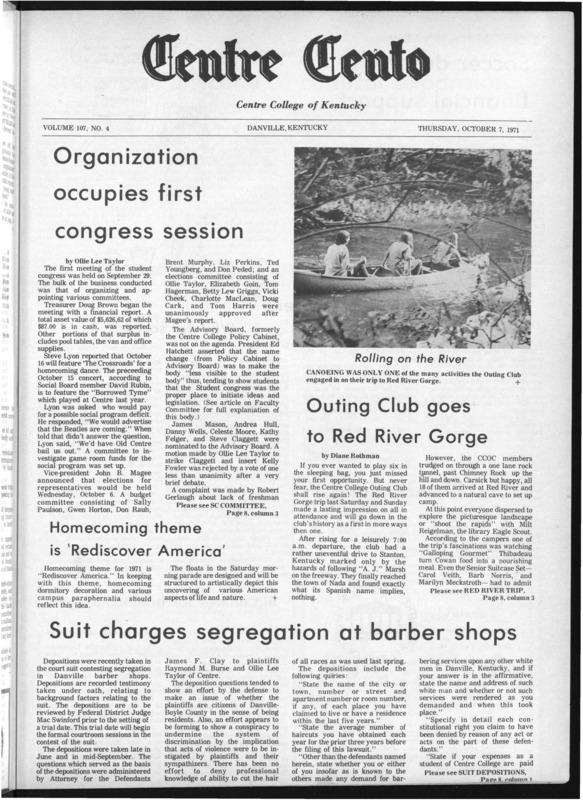 Centre College | Text
Centre College | TextSuit Charges Segregation at Barber Shops
An article giving more details regarding the charges against Danville barbershopsLearn more -
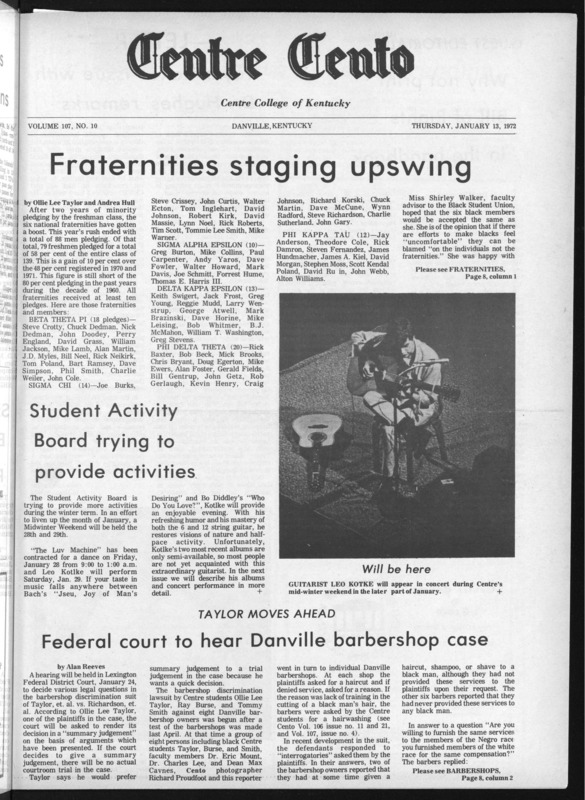 Centre College | Text
Centre College | TextTaylor Moves Ahead : Federal Court to Hear Danville Barbershop Case
Report on the barbershop discrimination suit of Taylor, et. al. vs. Richardson, et. al. There were barbershops in Danville that did not cut the hair of black customers. Centre students and community members brought light to the discrimination which eventually appeared in a federal court hearing.Learn more -
 Centre College | Text
Centre College | TextJudge Mac Swinford Rules in Favor of Summary Judgement
Explains the next steps in the lawsuit filed against the barbers in Danville that refused to cut black hair. The article emphasizes how students were determined to find a solution to put an end to segregation, even if the case was not ruled in their favorLearn more -
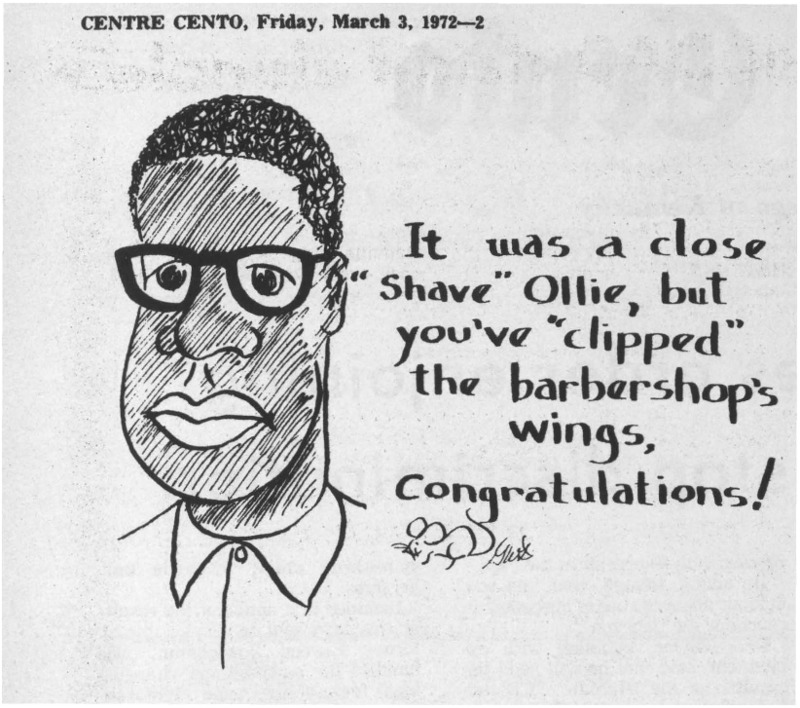 Centre College | Text
Centre College | TextIt Was a Close ‘Shave’ Ollie, but You’ve ‘Clipped’ the Barbershop’s Wings, Congratulations!; Discrimination Ordered Ended
Editorial cartoon celebrating the East District Federal Court order invalidating a section of Kentucky law that allowed Danville barbershops to discriminate against African American customersLearn more -
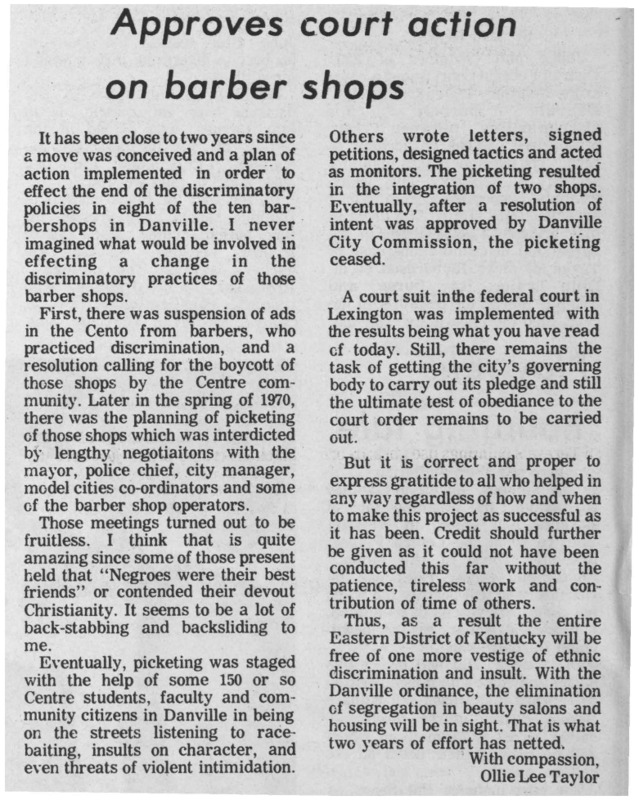 Centre College | Text
Centre College | TextApproves Court action on Barber Shops
Ollie Lee Taylor wrote a letter to express his appreciation to everyone who helped participate in the fight against discrimination in the local barbershops. He also wrote about the work that still needed to be done which included holding Danville accountable and continuing to push for change in other areas within the communityLearn more -
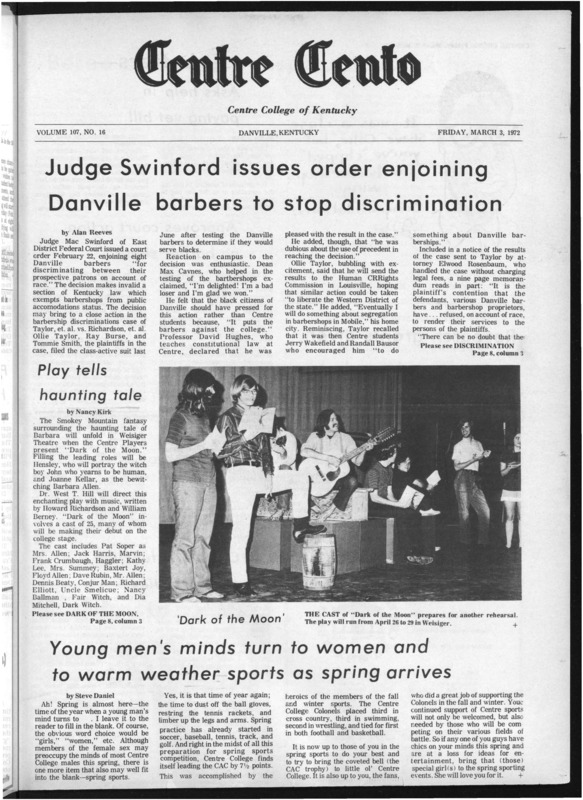 Centre College | Text
Centre College | TextJudge Swinford issues order enjoining Danville barbers to stop discriminating
The article explains how the judge ordered the barbers to integrate. Centre’s Dean expressed his excitement. There appears to be a positive reaction from faculty and staff members which may represent the attitudes of the leadership at this time.Learn more -
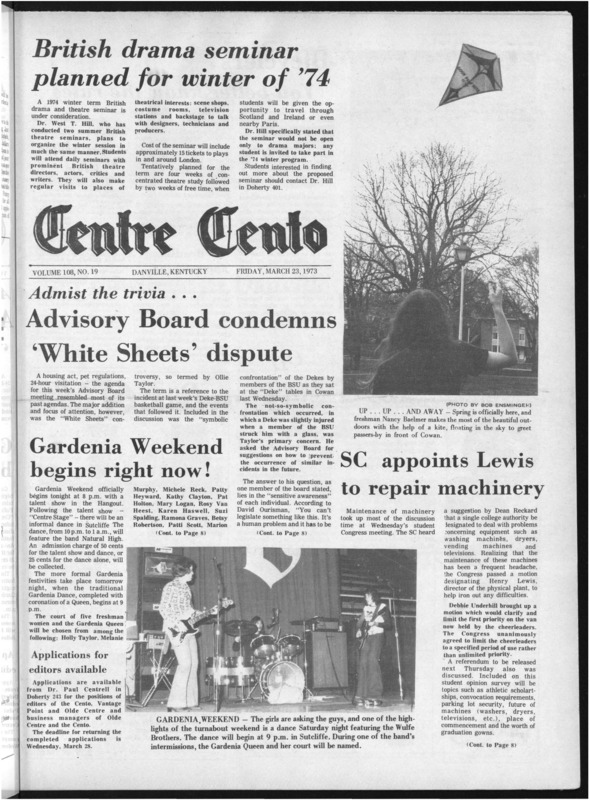 Centre College | Text
Centre College | TextAmidst the Trivia...Advisory Board Condems ‘White Sheets’ Dispute
Reporting on the Advisory Board meeting, during which was discussed, among other things (including the Yerkes lounge to be used by the BSU), the incident involving the Dekes wearing white sheets at the BSU basketball game, and ensuing confrontation between Dekes and members of the BSU at Cowan which resulted in a member of the Deke fraternity being injured after being struck by a glass by a member of the BSU.Learn more
